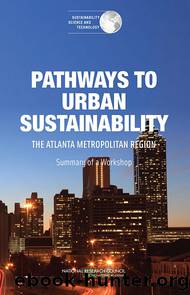Pathways to Urban Sustainability: The Atlanta Metropolitan Region by National Research Council of the National Academies

Author:National Research Council of the National Academies
Language: eng
Format: epub
Tags: Environment and Environmental Studies : Sustainable Development. Policy for Science and Technology : Policy for Science and Technology
Publisher: NATIONAL ACADEMIES PRESS
Published: 2011-06-14T00:00:00+00:00
SUSTAINABILITY AS A POINT OF DIFFERENTIATION
K.C. Boyce, Deputy Executive Director, Membership and Regional Impact, ICLEI-Local Governments for Sustainability, discussed how progress toward sustainability might be measured in the region. He presented the STAR Community Index, which uses comparative analysis to provide a common way of measuring progress in sustainabilityâeconomic, environment, and equity indices. The index has 81 metrics categorized under 10 goal areas; each has its own structure, consisting of a goal, purpose, and measure. He emphasized that the STAR Community Index has a âhigh bar, but a low floorâ so that top-performing communities would have incentive to continue making progress, but lower-performing communities would not be precluded from measuring their progress. Mr. Boyce also remarked that communities were expressing interest in understanding the range of positive possibilities for becoming more sustainable (rather than only measuring the decrease in undesirable indicators).
Mr. Boyce noted that, until recently, indicators of sustainability for different cities did not have enough in common to make useful quantitative comparison. This makes it difficult if not impossible to verify claims emanating from communities. To share a common vision and carry out concerted action, it is useful to have a common language and set of metrics. He acknowledged that this is not without challenges, and he cited the example of defining âadequateâ health care. At the same time, Mr. Boyce noted that not all sustainability indicators are directly comparable between communities.
Carol Couch, Senior Public Service Associate, College of Environment and Design, University of Georgia, elaborated on this when she pointed out that stakeholders needed to have a benchmark for the regionâs ecosystem services. Quantifying (and, where possible, monetizing) these services would help improve decision makersâ understanding of the tradeoffs inherent in different patterns of development. Graeme Lockaby, director, Center for Forest Sustainability, Auburn University, pointed out that macroeconomic analyses are not suited to local ecological scales, and so it is easy to miss declines in ecosystem services resulting from urban expansion. He cited two specific examples from his studies in western Georgiaâfirst, that regional water availability tends to decrease as urbanization (i.e., land conversion) increases, and second, that the threshold for urban forest canopy and species diversity is about 15 percent. In these cases, changes to the land threaten services that at least some residents in the region value.
Environmental justice, a priority issue in metropolitan Atlanta and at a federal level, is another spatial indicator. Several participants noted that, in addition to concerns about environmental pollutionâs adverse impacts on segments of the regional population (e.g., by race or income), it will also be important to measure the degree to which all segments of the population are benefiting from environmental improvements in the region. Examples included access to green space, healthy food options, and multiple modes of transit.
Download
This site does not store any files on its server. We only index and link to content provided by other sites. Please contact the content providers to delete copyright contents if any and email us, we'll remove relevant links or contents immediately.
Whiskies Galore by Ian Buxton(41995)
Introduction to Aircraft Design (Cambridge Aerospace Series) by John P. Fielding(33122)
Rewire Your Anxious Brain by Catherine M. Pittman(18644)
Craft Beer for the Homebrewer by Michael Agnew(18237)
Cat's cradle by Kurt Vonnegut(15339)
Sapiens: A Brief History of Humankind by Yuval Noah Harari(14371)
Leonardo da Vinci by Walter Isaacson(13319)
The Tidewater Tales by John Barth(12653)
Thinking, Fast and Slow by Kahneman Daniel(12267)
Underground: A Human History of the Worlds Beneath Our Feet by Will Hunt(12090)
The Radium Girls by Kate Moore(12019)
The Art of Thinking Clearly by Rolf Dobelli(10457)
Mindhunter: Inside the FBI's Elite Serial Crime Unit by John E. Douglas & Mark Olshaker(9324)
A Journey Through Charms and Defence Against the Dark Arts (Harry Potter: A Journey Throughâ¦) by Pottermore Publishing(9275)
Tools of Titans by Timothy Ferriss(8369)
Wonder by R. J. Palacio(8100)
Turbulence by E. J. Noyes(8040)
Change Your Questions, Change Your Life by Marilee Adams(7762)
Nudge - Improving Decisions about Health, Wealth, and Happiness by Thaler Sunstein(7694)
